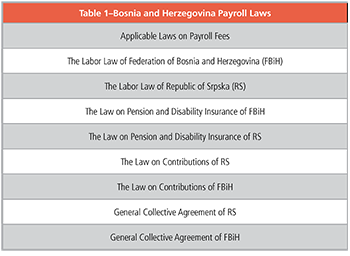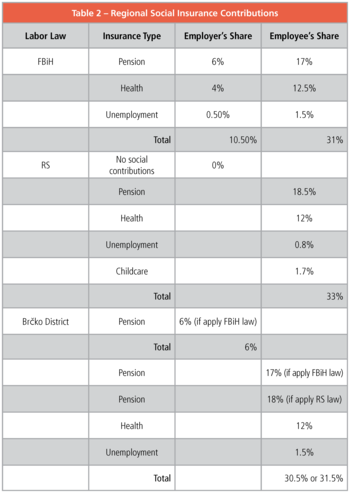
Bosnia and Herzegovina—often known informally as Bosnia or BiH—is a Southeastern European country within the Balkan Peninsula. It is bordered by Croatia, Serbia, and Montenegro with a narrow coast along the Adriatic Sea.
Due to its borders, the country’s population is multiethnic with three main constituent peoples: Bosniaks, Serbs, and Croats. Bosnia and Herzegovina has a bicameral legislature with a three-member presidency to represent each major group. The country also has three official languages—Bosnian, Serbian, and Croatian.
The country is currently an applicant for membership to the European Union (EU) and has been a candidate for NATO membership since 2010. It is currently a member of the UN and the Council of Europe among other organizations. It is also a founding member of the Union for the Mediterranean.
Social Insurance Foundation
 Social security contributions (i.e., pension/disability and health insurance) are paid both by employers and employees on the gross amount of the salary.
Social security contributions (i.e., pension/disability and health insurance) are paid both by employers and employees on the gross amount of the salary.
In the Republic of Srpska (RS), social insurance contributions are also calculated on the gross amount of the employee’s salary. In Brčko District, pension insurance contributions are regulated by entity regulations (see note below). The social insurance contributions are deducted from the gross salary based on percentages shown in Table 2.
A new special contribution for the solidarity fund was established in 2018 for the treatment of children with rare diseases. It is fully a cost of the employee, 0.25% of the net salary. An employee who is not willing to pay this contribution can file a personal request with the health fund.
Tax Deductions
The personal income tax rate across the entire territory of BiH is 10%, and the base for tax calculation is gross deducted for contribution amount tax deduction amount. The tax deduction for RS is 500.00 convertible marks (BAM) monthly and for FBiH it is 300.00 BAM monthly and additionally, based on the tax card issued by the tax administration (every employee has the right to an additional tax deduction for close family dependents or interest paid on a housing loan).
Employment Procedure
Labor laws in BiH recognize different types of employment contracts such as:
- Permanent
- Temporary
- Part time
- Seasonal
- Probationary
The employment procedure in BiH is stipulated by the Labor Law and is based on the employment contract (must be in written form) signed by employees for a definite or indefinite period. Among other conditions, the employment contract must consist of the following:
- The name and address of the employer
- Qualification and residence of the employee
- Employee’s salary
- Duration of the contract
- Annual leave duration
- Working hours
- Place of work
- Time of conclusion of work
- Working conditions
- Description of the duties and rights
- Dismissal notice
 Upon signing a labor agreement, the employer has an obligation to register employees to the Pension/Disability Fund and the Health Fund. The probation period may not last longer than six months for FBiH, and three months for RS.
Upon signing a labor agreement, the employer has an obligation to register employees to the Pension/Disability Fund and the Health Fund. The probation period may not last longer than six months for FBiH, and three months for RS.
The normal working hours are eight hours per day or 40 hours per week. The workweek lasts five consecutive days (Monday to Friday). In cases such as an increase of work volume and force majeure (e.g., earthquake, flood, fire), employees are obliged under the request of the employer to work overtime, which could be up to 10 hours a week for RS and eight hours for FBiH.
The employment contract can also be signed on a part-time basis, providing that employees are entitled to social insurance contributions and all other rights in proportion to the time spent at work. Employers may conclude a contract with a trainee for the specific professions determined as the trainee period by Bosnian authorities.
Protection of Employment
Holidays: In accordance with the Labor Laws in FBiH and RS, the minimum annual leave is 20 days but no longer than 30 working days, during which the employees are entitled to a full salary compensation based on the laws, collective agreements, and rulebooks. Employees who are younger than age 18 (minors) are entitled to a minimum of 24 days of annual leave, while employees who are engaged in jobs under special working conditions are entitled to a minimum of 30 paid leave days by the labor law of FBiH. Employers may agree with employees to divide their annual leave in two parts, provided that one part of the annual leave is not less than two weeks without interruption.
Illness: Under the labor laws of BiH, employees are entitled to an additional paid leave of absence for five working days for RS, and seven working days for FBiH, annually in cases of serious illness and death of family members. Employees may refuse to work if the employer does not meet health and safety measures at the workplace. Employers must register all employees for Health and Health/Disability Insurance and enable the full protection of employees against any accidents at work.
During an employee’s temporary inability to work, employers cannot terminate the employment contract with an employee who suffered an injury at work or was sick. The employer must allow employees to return to the same jobs.
Maternity: Women are entitled to maternity leave for a period of one year without interruption during the pregnancy, child birth, and after the birth for the care of the baby. Under the labor law of RS, in case of the birth of twins or a third child, women are entitled to 18 months of maternity leave. The woman may start maternity leave on her demand within 28 days before the due date and on recommendation of a doctor. She may start work before the expiration of her maternity leave, but not before 60 days after the child’s birth by the labor law of RS, and 42 days by the labor law of FBiH. She is entitled to a 60-minute break during working hours for child feeding and other care. During maternity leave, women are entitled to full salary compensation, the net amount of which could be reverted to the employer from social service with prompt and correct application supported by necessary documents.
Payroll Calculation Procedure
The tax base is the net income. After all deductions are made, including social insurance contributions, personal income tax, and other taxes, the employee is entitled to a net salary.
Termination of Employment
Employment contracts can be terminated both by the employer or employee upon agreement, death of the employee, by the decision of a competent court, and expiration of the period stated on the contract if it is concluded, etc. In BiH, employers are entitled to terminate the employment for various reasons including lack of organizational or technical skills or on economic basis, poor performance, or different types of misconduct. The notice period cannot be shorter than 15 days if the employee terminates the employment contract, or shorter than 30 days if the employer terminates the employment contract. The notice period starts upon submission of the written notice either from employers or employees.
Do you like our content? Join the GPMI community to get free education and articles straight to your inbox!

Dajana Topic joined Eurofast in 2012 as a Regional Executive for Bosnia, Croatia, and Slovenia. Topic’s responsibilities include implementing the operational practices of offices in Banja Luka, Sarajevo, Zagreb, and Ljubljana, as well as strategic objectives in the region. She studied Economics in Banja Luka, specializing in business and entrepreneurship. She holds a Master’s degree from the Frederick University Nicosia in Cyprus. Topic has more than 10 years of experience in the area of marketing, business development, and financial services including tax, accounting, and payroll. She has been involved in a number of projects regarding foreign investments, EU funds, business plans, and various marketing activities in BiH, Croatia, and Serbia. She is also a speaker at various seminars focusing on tax-related issues and investments in the region. Topic speaks Serbian, English, and Greek.